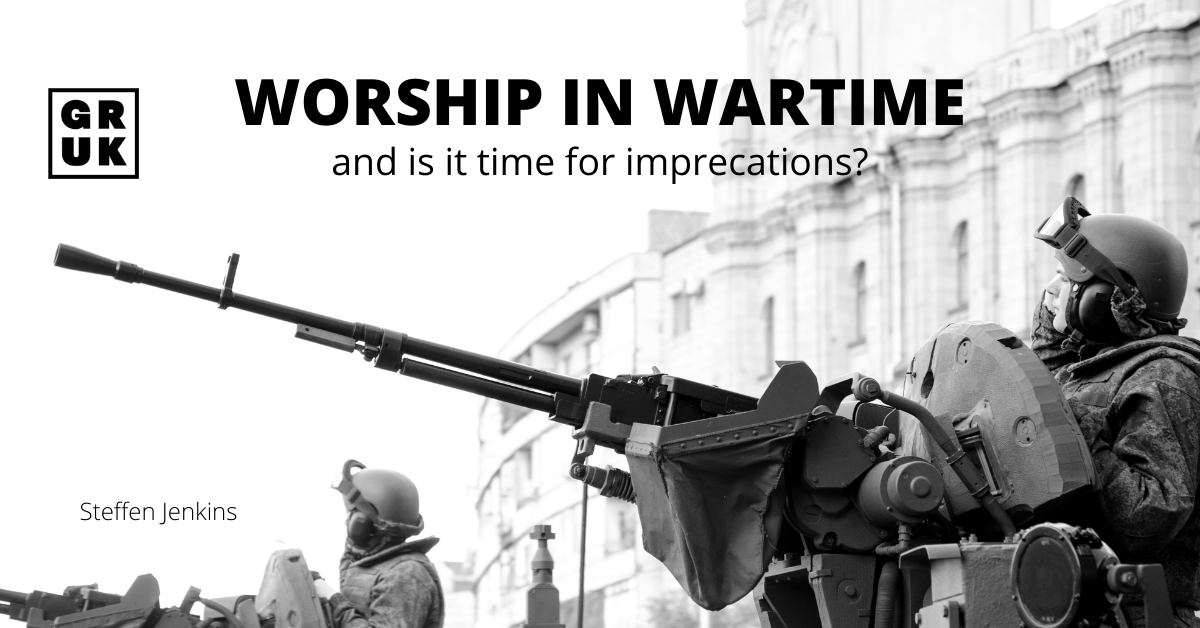On Worship In Wartime — and is it time for imprecations?
During WWII, CS Lewis, a veteran of WWI trenches, preached a sermon to a (largely) university congregation in which he asked: can we really give ourselves to scholarship when there is a war on?
He masterfully began by pointing out a more glaring question: can we really give ourselves to scholarship when there is a Hell? His answer to both questions repays reading. Why not put away this silly blog and go find it?
I have been invited to write briefly on whether we should use imprecatory psalms in light of current events in Eastern Europe. I want to introduce that question by asking the question: should we really be doing something as banal as Bible reading, prayer, even corporate worship, when there is a war on?
My answer is that Jesus, when we worship him, teaches us certain attitudes and convictions. We cannot give ourselves properly to urgent, pressing global matters unless we continue to allow Jesus to cultivate that right state of our minds and affections. If we want to serve him in the world, he needs to keep building us up in our worship. Let’s look at how that works.
Whom does Jesus call to worship?
Psalm 117:1–2 (ESV)
Praise the Lord, all nations! Extol him, all peoples!
For great is his steadfast love toward us,
and the faithfulness of the Lord endures forever.
Praise the Lord!
Verse 2 extolls the faithfulness and mercy of Jesus to his people, those who already worship him. But we take that on our lips as the reason for the call of v1: all nations, all peoples. The Psalms open by warning the world’s leaders (2:1) and the people whom they govern (2:2) to the come and serve the Lord, to make peace with the Son (2:10–12). The Psalms end by announcing a day of judgment against the very same, if they have not turned (149:6–9), before issuing a call to universal worship (“everything that has breath”) of God: Ps 150.
When we respond to God’s call to worship him together, we need always to be mindful that the call is issued to unbelievers who need to repent as well. It is issued to Presidents and nations. We are not turning our backs on troubled nations when we worship Jesus: we are setting them an example. We are being the community that is built up by the Prince of Peace. Peace cannot really come from anywhere else. Nations will melt down their weapons, and benefit from lasting peace settlements, only when they worship Jesus: Isa 2:2–4.
Forgo the work of Jesus in our lives, by forgoing his worship, and we stop being the solution and start being the problem.
Call to confession
Psalm 14:3 (ESV)
They have all turned aside; together they have become corrupt;
there is none who does good, not even one.
Psalm 51:5 (ESV)
Behold, I was brought forth in iniquity,
and in sin did my mother conceive me.
Psalm 130:3–4 (ESV)
If you, O Lord, should mark iniquities,
O Lord, who could stand?
But with you there is forgiveness,
that you may be feared.
When God’s people gather together, Jesus reminds us that the problems of the world are not out there, in some distant land, or even outside the doors of the church. The problems of the world are right here, in each of our own hearts.
Woe betide the Christian who thinks that our nation, our leaders, or even our churches, belong to a different species from those who start wars. Not for nothing does the NT base a command to pray for our leaders on the truth that God desires all men to be saved. Our leaders need to be saved: 1 Tim 2:1–3. We need to have our sins forgiven. We need to distrust the devices of our own hearts.
Worship will slow down our joining of self-righteous mobs. If truth is the first casualty of war, the church must make sure that one truth keeps ringing out:
1 John 1:8–9 (ESV)
If we say we have no sin, we deceive ourselves, and the truth is not in us. If we confess our sins, he is faithful and just to forgive us our sins and to cleanse us from all unrighteousness.
A call to adoration and intercession
Before we engage in action of any kind for a trouble part of the world, what is it that we want for them? What is the nature of the blessing that we would bestow on them?
If it is peace, then what does that peace look like?
Does it not mean a community where there is peace with God, the only author of true and lasting peace? Does it not mean a community where we do not focus on each other’s faults against each other, but bear one another’s burdens?
Should we not continue to be such a community as we adore the author of such blessing, and as we ask Him to care for those among us who are burdened?
Isn’t that what should happen all over troubled regions as their churches grow? Isn’t repentance towards God and repentance into such a community what we want for warmongers? Then how can we ourselves put that on hold in our lives?
Equally, let’s pray for just that: Christians, churches, missionaries and seminaries where the peace of God, which passes all understanding, keeps their hearts and minds in Jesus, and which shamelessly preaches and teaches a better way to live. May God increase their tribe as a means to ending war. Shall we shrink our tribe because there’s a war on?
A call to hear his word
We aren’t naturally good at loving our neighbour, because we are born with an inclination to despise the God who truly loves our neighbour. We need to let him teach us how to receive his love for us through the cross of Christ, how to love him, and as a result to love our neighbours. Any other laying down of weapons is just a truce, not peace.
Psalm 119:176 (ESV)
I have gone astray like a lost sheep; seek your servant,
for I do not forget your commandments.
What about imprecations?
World peace must begin with the awareness of our own sinfulness. Our worship will instil and reinforce that awareness and due humility in the face of enemies, whether our own or those of others. Presumably, then, we should avoid including prayers that are focussed against enemies. The notorious psalms which do this must be far from our thoughts and our worship, right?
Actually, those are the very psalms where we are confronted with our own unworthiness in the clearest possible way. Our kind hosts have a podcast on how that works for us as individuals, see more here.
This coming Thursday I’ll be inviting us to think about how this applies to nations and even to the current goings on, whatever they might be by the time Thursday comes round! Why don’t you join us for this talk?








